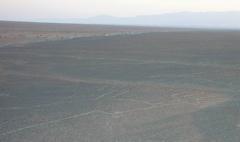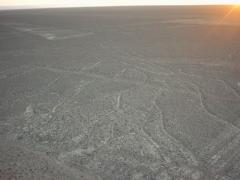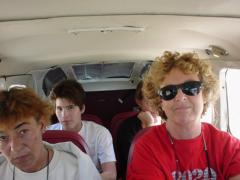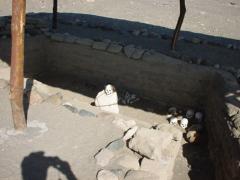Nazca Lines
Heading south from the Ica/Paracas area, we encounter the
incomparably famous "Nazca Lines". In Spanish, we
note they are called "Lineas y Figuras" -- or lines
and figures. In Japanese, "chijou-e", or "pictures
drawn on the earth". In English, just "lines".
Herein lies some confusion. In fact, drawn in an eerily large
scale on the desert floor near Nazca are both lines
and figures. The lines, which I think many are not really
aware of, come in two flavors -- perfectly straight lines
extending unreasonably far into the distance; and trapezoidal
shapes vaguely reminiscent of landing strips for some fantastical
aircraft. The pictures range from the monkey, the condor,
the famed hummingbird, to the whale, the tree, and the hands.
The pictures are smaller than one might expect -- I can easily
imagine a group of intelligent folks planning and executing
one of these smallish figures, using the simple method of
turning over the surface of the desert to expose the white
sand underneath. As for the meaning of the lines, I suppose
the explanation of the famed German researcher Reiche, that
the lines represent a huge astronomical calculator, is reasonable
and correct.
 |
View from Mirador. Approaching
the town on the Pan-American Highway, we got our first
view of the lines from the Mirador, or vantage platform.
This is the image called the "Hands".
|
 |
The image called the "Tree" is also visible
from the Mirador.
|
 |
Ko and I went up in an airplane for the obligatory
aerial view of the lines. Unfortunately, my camera technique
was not up to getting any good shots of the lines from
the plane.
|
 |
Nazcan Tombs. In the desert
sands outside Nazca lie these tombs containing mummies,
characteristically buried with the objects meant to
accompany them on their supposed travel to the next
world, including the fantastic Nazca textiles finely
woven to endure for centuries. Grave robbers violated
these tombs long ago; what we see now are the mummies,
until recently scattered rudely across the desert floor,
placed back into their original excavated tombs.
|
But why did this ancient culture create these unique lines
and figures? I believe that the extensive, almost perfectly
flat desert floor near Nazca presented itself to the leaders
of the Nazca culture as an ideal and perfect canvas, begging
them to draw on it -- which challenge they gladly accepted.
|